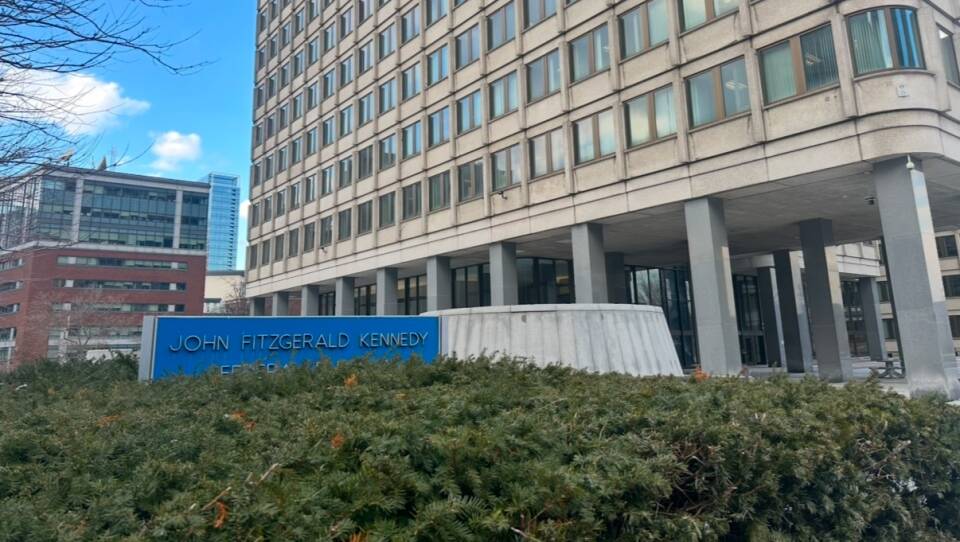Immigration court is the inevitable reality for thousands of individuals in Massachusetts. To remain here legally, going to hearing dates is a must.
But the court itself will soon undergo significant upheaval, from both administrative changes and caseloads that could pile on to the already strained system. That’s worrying immigrants and advocates, with some families wondering if they should avoid public spaces, including courthouses.
“I think there are concerns about encountering ICE in almost any situation that immigrants go into who are in temporary or uncertain statuses,” said Liz Sweet, executive director of the Massachusetts Immigrant and Refugee Advocacy coalition.
The landmark case Ryan v. ICE blocks immigration arrests in and around Massachusetts courthouses. But that only applies to state courts, according to Middlesex County District Attorney Marian Ryan’s office. It doesn’t apply to federal immigration court.
There will likely be an increase of deportation cases given the Trump administration’s decision this week to revoke the humanitarian parole programs created under Biden, and on Friday to revoke the legal statuses of hundreds of thousands of migrants who came to the U.S. in the past few years under legal parole programs that granted deportation protections.
The Trump administration fired four leaders of the system this week, pulling away administrative leadership that could help courts run efficiently. The one benefit to advocates could be bureaucracy, which the Executive Office for Immigration Review, the entity that runs the courts under the Department of Justice, is notorious for.
“We are likely to see both massive slowdowns in the courts, in their operations and the management of cases, as well as more disorganization and perhaps even chaos in the courts,” said Gregory Chen, senior director of government relations with the American Immigration Lawyers Association. He said the typical case is taking anywhere from five to seven years to resolve.
The immigration court system operates differently than your standard court guaranteeing rights under Article 3 of the Constitution. It’s more subject to policy changes and political process from any executive branch administration, as the Department of Justice is technically part of the the executive branch, overseeing those courts.
The right to a speedy trial, afforded in a standard criminal court, doesn’t exist, meaning that detained individuals could languish in county jails contracted with ICE for a long time. Some cases can take a matter of weeks. Discretion dominates the court significantly, along with the priorities of the president.
Massachusetts’ immigration courts
In August 2024, the Boston immigration court had a backlog of over 160,000 cases. It was in the top seven of backlogged courts in the country last year. It is unclear if the opening of the immigration court in Chelmsford has had impact on the number of cases, but there’s at least 16 judges at the facility, much more than Boston’s court, according to sources.
There are ten immigration judges listed as operating out of Bostons court, and at least 30 “internet-based” judges, which can be located in other states. Chelmsford handles detained immigrants cases along with other types of cases. Boston handles all types — those can be for asylum, adjustment of status, removal cases, and others.
In 2024, the Biden administration created a new fast-track docket in five cities, including Boston, where judges could rule on cases for migrants who settled in this area within 180 days instead of the average time of years it was taking for those cases to play out. It is unclear if that continues.
What can come next
The Friday decision to revoke the statuses of hundreds of thousands of immigrants will be challenged in federal court, but could impact the caseloads in immigration court. The Trump administration has something it didn’t have during its first — the location information gathered by federal immigration officials when immigrants were granted parole status and released into the country with court dates under Biden. It will be much easier for federal agents to find people’s locations in this manner.
Before the Trump administration, a judge could order someone deported “or removed” from the country, but they were expected to make the plans by a certain date on their own. Now, it is possible people could be immediately apprehended when a judge makes their decision.
“Our clients are really scared. They’re feeling a sense of chaos and honestly, terror,” said Sarah Sherman-Stokes, clinical associate professor of law at Boston University School of Law. “They’re worried that there’s going to be an increased risk of enforcement at home, in the community, in their workplaces and at immigration court.”
The dozens of clients she and her colleagues assist at the Immigrants Rights and Human Trafficking Clinic are in removal proceedings, but mostly not detained. Those include immigrants who articulated their request for asylum at the border, were detained, and then granted parole into the U.S. pending their hearings.
There is also a way that immigrants detained bypass the immigration court system entirely. The Trump administration approved its old policy is “expedited removal” this week allowing officials to deport immigrants lacking papers through a fast process. Immigrants who don’t request asylum or make known that they have an asylum case could be fast-tracked to be deported without seeing a judge.
“The officer becomes effectively both the arresting officer and the judge decider combined into one. Those can happen much more quickly than court. And yes, that could be a way to bypass the judicial process,” said Chen. “We fully expect that the new administration will want to do that.”

Tips for immigrants
Go to your court date
“We absolutely would continue to advise all immigrants to show up for immigration court appointments,” said Sweet of MIRA. “If someone misses an appointment, they are generally ordered removed in absentia, and then have a deportation order on their record.”
It is possible to get the case reopened, experts told GBH News, but it is difficult and would require significant assistance from an attorney.
Beware notarios
Those are people who claim they can provide legal assistance but can’t actually represent you in immigration court, because they are unlicensed. An immigration court judge will not let a notario represent you.
Go to a know-your-rights training
A number of organizations, including MIRA, are holding these information sessions for concerned immigrants and their allies. They include advice about what to do, and what to avoid if you encounter federal immigration authorities in different circumstances.
Find a lawyer
You do have the right to counsel and to be represented by counsel in immigration court removal proceedings, but there is no right to counsel paid for by the government. The majority of people don’t have legal representation, impacting their ability to be successful, said Chen of AILA.
Don’t bring family with mixed legal status
While it’s recommended by attorneys that immigrants with court dates go to their hearings, it is not recommended that their family members who have mixed status join them to support in court.








